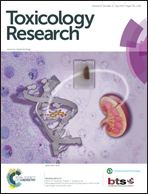Identification and quantification of biomarkers to confirm the poisoning by Ginkgo biloba seeds in a 2-year-old boy
Abstract
The seeds of Ginkgo biloba are commonly eaten in Japan, Korea and China, but it is important to know that they can be responsible for poisoning, especially in young children. Poisoning due to Ginkgo biloba seeds must also be considered as a possible clinical event in European countries, where Asian cuisine has recently become popular. This paper reports the case of a 23-months-old previously healthy male child who experienced two afebrile tonic-clonic seizures after the consumption of an unknown amount of Ginkgo seeds. The poisoning was identified by searching both in blood and urine for 4′-O-methylpyridoxine (MPN) as a specific biomarker for ginkgo poisoning, using an optimized and validated HPLC method with fluorimetric detection. The MPN concentrations in serum were 16.5 and 6.2 ng mL−1 14 and 20 hours after the exposure, respectively, while the urine concentration was below the limit of detection (1.35 ng mL−1). The involvement of ginkgo seeds in the described poisoning was confirmed by searching ginkgolide terpene lactones in urine, where the ratio between excreted ginkgolide A : B : C was 1 : 40 : 2. The analytical data obtained by looking for biomarkers in serum and urine demonstrate that even low values of MPN/ginkgolide concentration can be responsible for convulsions and other adverse effects.


 Please wait while we load your content...
Please wait while we load your content...